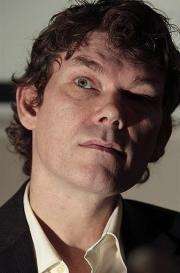Gary McKinnon, seen here in Janurary 2009.A Briton accused of hacking into US military and NASA space agency computers was on Friday refused permission to appeal to the new Supreme Court in London against his extradition to the United States.
A Briton accused of hacking into US military and NASA space agency computers was on Friday refused permission to appeal to the new Supreme Court in London against his extradition to the United States.
The High Court had turned down Gary McKinnon's extradition challenges and on Friday refused him leave to appeal, ruling that that his case did not raise "points of law of general public importance" -- a prerequisite of being able to pursue a cause in the Supreme Court.
The 43-year-old could spend life in prison if convicted by a US court of gaining access to 97 computers in 2001 and 2002 in the aftermath of the September 11, 2001 attacks on the United States.
He says he was only looking for evidence of unidentified flying objects (UFOs), while his supporters argue he has Asperger's Syndrome, a form of autism.
His legal team said it would now consider applying to the European Court of Human Rights in Strasbourg, eastern France.
Lawyer Karen Todner said: "Why is our government so inhumane as to allow this to happen to someone, particularly someone with Asperger's, a form of autism?
"This is the wholesale destruction and bullying of a small individual by the United States and now our own government.
"Our extradition treaty with the US is unfair and prejudicial to UK citizens and should be repealed or amended immediately."
Britain's extradition treaty with the United States also came under fire.
Chris Huhne, interior affairs spokesman for the opposition Liberal Democrats, said: "The government's one-sided extradition treaty with the US and its refusal to stand up to the Americans looks like it will result in a vulnerable man being hung out to dry."
(c) 2009 AFP




















